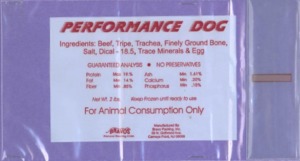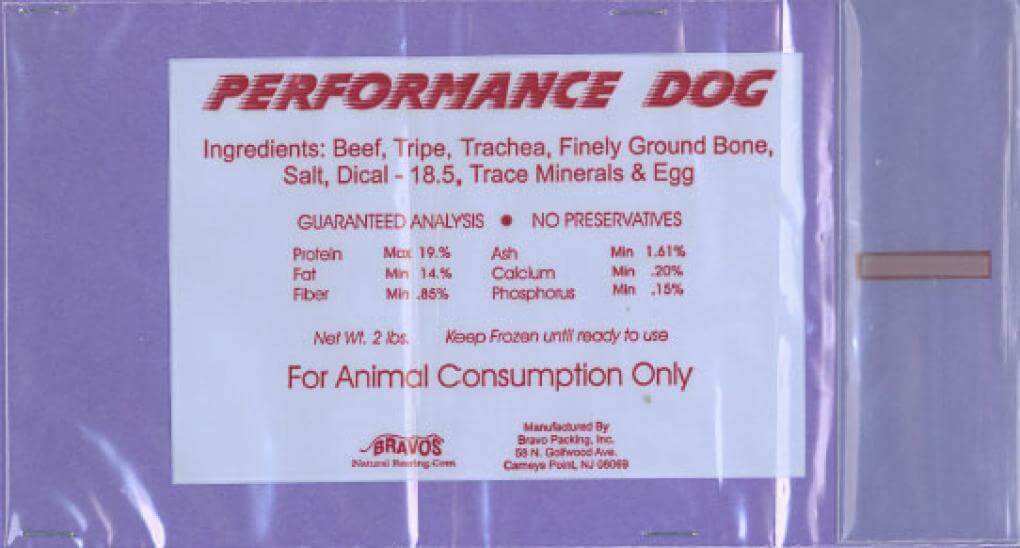IMPORTANT NOTICE
This FDA Notice Is Not Related to
Raw Performance Dog Food of Ontario, Canada
September 26, 2019 — The U.S. Food and Drug Administration is cautioning pet owners not to feed their pets any Performance Dog frozen raw pet food after a sample tested positive for Salmonella and Listeria monocytogenes (L. mono).

What Caused the Recall?
Two samples of different finished products collected during an inspection of Bravo Packing, Inc., the manufacturer of Performance Dog raw pet food, tested positive for Salmonella and/or Listeria monocytogenes.
One of the products sampled had not yet been distributed.
The product that entered the marketplace is Performance Dog raw pet food, lot code 072219, sold to customers frozen in two-pound pouches.
Lot codes are printed on the outside of the boxes used to distribute the product, but the lot codes are not printed on the individual sealed plastic pouches, also known as chubs.
Therefore, there are no unique identification numbers on the individual chubs that would allow customers to verify whether their product belongs to the affected lot.
The FDA is cautioning about all Performance Dog frozen raw pet food produced on or after July 22, 2019 because the products do not have lot codes printed on retail packaging.
If you have any Performance Dog product that you purchased after July 22, 2019, throw it away.
Why Is FDA Concerned?
FDA is issuing this alert because Performance Dog raw pet food represents a serious threat to human and animal health.
Because these products are sold and stored frozen, FDA is concerned that people may still have them in their possession.
This is the second time Bravo Packing, Inc. product has tested positive for pathogen contamination. In September 2018, Bravo Packing, Inc. recalled all Performance Dog frozen raw pet food due to Salmonella.
Also, during a 2016 inspection, the FDA collected samples of Bravo Packing, Inc. horse meat chunk animal food that tested positive for the drugs pentobarbital and phenytoin.
Pet foods and treats contaminated with Salmonella and Listeria mono are of particular public health importance because they can affect both human and animal health.
Pets can get sick from these pathogens and may also be carriers of the bacteria and pass it on to their human companions without appearing to be ill.
People can get sick from handling contaminated pet foods and treats or touching surfaces that have had contact with the contaminated pet foods and treats.
Additionally, if a person gets Salmonella or L. mono on their hands, they can spread the bacteria to other people, objects, and surfaces.
The Federal Food, Drug, and Cosmetic Act requires that all animal food, like human food, be safe to eat, produced under sanitary conditions, contain no harmful substances, and be truthfully labeled.
Without an effective control for pathogens, such as cooking, animal food is more likely to contain pathogens such as Salmonella and L. mono.
Refrigeration or freezing does not kill the bacteria.
About Salmonella
Salmonella is a bacterium that can cause illness and death in humans and animals, especially those who are very young, very old, or have weak immune systems.
According to CDC, people infected with Salmonella can develop diarrhea, fever and abdominal cramps.
Most people recover without treatment, but in some people, the diarrhea may be so severe that they need to be hospitalized.
In some patients, the Salmonella infection may spread from the intestines to the blood stream and then to other body sites unless the person is treated promptly with antibiotics.
Consult your health care provider if you have symptoms of Salmonella infection.
Salmonella in Pets
Pets do not always display symptoms when infected with Salmonella, but signs can include vomiting, diarrhea (which may be bloody), fever, loss of appetite and/or decreased activity level.
If your pet has these symptoms, consult a veterinarian promptly.
You should also be aware that infected pets can shed the bacteria in their feces and saliva without showing signs of being sick, further contaminating the household environment.
About Listeria Monocytogenes
Listeria monocytogenes is a bacterium that can cause illness and death in humans and animals, especially those who are pregnant, very young, very old, or have weak immune systems.
According to CDC, listeriosis in humans can cause a variety of symptoms, depending on the person and the part of the body affected.
Symptoms can include headache, stiff neck, confusion, loss of balance, and convulsions in addition to fever and muscle aches.
Pregnant women typically experience only fever and other flu-like symptoms, such as fatigue and muscle aches.
However, infections during pregnancy can lead to miscarriage, stillbirth, premature delivery, or life-threatening infection of the newborn.
Pregnant women and their newborns, adults age 65 and older, and people with weakened immune systems are more likely to get sick with listeriosis.
Anyone with symptoms of listeriosis should contact a health care provider.
Listeria in Pets
L. mono infections are uncommon in pets, but they are possible.
Symptoms may include mild to severe diarrhea; anorexia; fever; nervous, muscular and respiratory signs; abortion; depression; shock; and death.
Pets do not need to display symptoms to be able to pass L. mono on to their human companions.
As with Salmonella, infected pets can shed L. mono in their feces and saliva without showing signs of being sick, further contaminating the household environment.
What to Do?
If you have any of the affected product, stop feeding it to your pets and throw it away in a secure container where other animals, including wildlife, cannot access it.
Consumers who have had this product in their homes should clean refrigerators/freezers where the product was stored and clean and disinfect all bowls, utensils, food prep surfaces, pet bedding, toys, floors, and any other surfaces that the food or pet may have had contact with.
Because animals can shed the bacteria in the feces when they have bowel movements, it’s particularly important to clean up the animal’s feces in yards or parks where people or other animals may become exposed, in addition to cleaning items in the home.
Consumers should thoroughly wash their hands after handling the affected product or cleaning up potentially contaminated items and surfaces.
U.S. citizens can report complaints about FDA-regulated pet food products by calling the consumer complaint coordinator in your area.
Or go to https://www.fda.gov/petfoodcomplaints.
Canadians can report any health or safety incidents related to the use of this product by filling out the Consumer Product Incident Report Form.
Get Dog Food Recall Alerts by Email
Get free dog food recall alerts sent to you by email. Subscribe to The Dog Food Advisor’s emergency recall notification system.
Recalls & Warnings
See all recalls| Date | Brand/Store, Issue type & Product | Issue type | Product |
|---|---|---|---|
| 09.22.2024 |
Answers
Answers Pet Food Voluntarily Withdrawals Certain Lots Due to Potential Salmonella and Listeria
RECALL
|
RECALL | Answers Pet Food Voluntarily Withdrawals Certain Lots Due to Potential Salmonella and Listeria |
| 09.20.2024 |
Arrow Reliance Inc
FDA Warning After Salmonella and Listeria Monocytogenes Detected in Darwin’s Natural Pet Products
RECALL
|
RECALL | FDA Warning After Salmonella and Listeria Monocytogenes Detected in Darwin’s Natural Pet Products |
| 07.01.2024 |
Viva
Viva Recalls Turkey And Puppy Recipes Due To Listeria Monocytogenes Contamination
RECALL
|
RECALL | Viva Recalls Turkey And Puppy Recipes Due To Listeria Monocytogenes Contamination |
| 06.20.2024 |
TDBBS
TDBBS voluntarily recalls Green Tripe dog treats due to the potential presence of foreign metal objects
RECALL
|
RECALL | TDBBS voluntarily recalls Green Tripe dog treats due to the potential presence of foreign metal objects |


